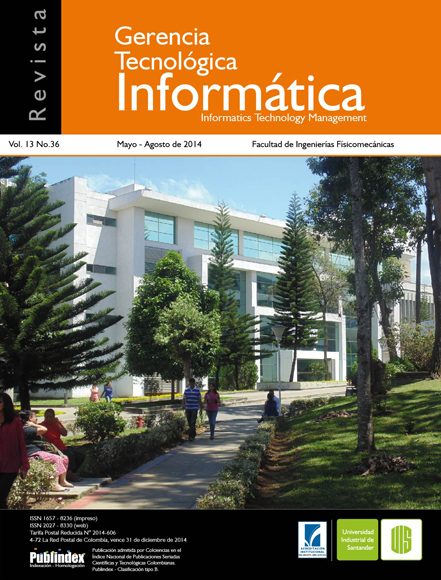INSTRUMENTO PARA LA VALIDACIÓN DE LA IDONEIDAD DE MÉTRICAS PARA SPC EN VSES
Published 2015-01-15
How to Cite
Abstract
RESUMEN ANALÍTICO
El control estadístico de procesos (SPC por sus siglas en inglés) es un método para la gestión de los procesos que se lleva a cabo a través de un análisis estadístico, el cual incluye definición, medición y control de los procesos. No obstante una dificultad para la aplicación de SPC en el contexto del software es la definición de un sistema de medición, fundamentalmente lo relacionado con la identificación de las métricas a usar y la captura de sus medidas. Las métricas son el insumo principal para la aplicación de SPC, por lo que es crucial identificar las métricas idóneas para su aplicación en la técnica de gráficos control. En este artículo se propone un instrumento que permite validar la idoneidad de las métricas que pueden ser útiles para la aplicación de SPC en el contexto de las pequeñas organizaciones desarrolladoras de software (VSEs). Dicho instrumento fue aplicado al interior de un proyecto de investigación que pretendía determinar un conjunto de métricas del proceso de construcción de software que fueran útiles y adecuadas para SPC en VSEs. Los resultados obtenidos de esta aplicación evidencian la idoneidad del instrumento para cumplir su objetivo.
PALABRAS CLAVES: Control Estadístico de Procesos, Métricas Software y VSEs.
INSTRUMENT FOR THE VALIDATION OF THE SUITABILITY OF A METRICS TO SPC IN VSES
ANALYTICAL SUMMARY
The Statistical Process Control (SPC) is a method for the process management that carries out through a statistical analysis, which includes definition, measurement and process control. However a difficulty to the application of SPC in the software context is the definition of a measurement system, fundamentally related with the identification of metrics and the capture of their measures. The metrics are the main input for the application of SPC, so it is crucial to identify the suitable metrics for their application inside the control graphics technique. This article presents an instrument that allow validate the suitability of the metrics that can be useful for SPC in the context of the Very Small Entities (VSEs). This instrument was applied into a research project that aimed to establish a set of metrics (of the software construction process) useful and appropriate for SPC in VSEs. The results of this application demonstrate the suitability of the instrument to meet its objective.
KEYWORDS: Statistical Process Control, Software Metrics and Software Process and VSE.
Forma de citar: Garzón Bravo, G. G., Miranda Caicedo, P. F., & Pino Correa, F. J. (2014). Instrumento para la validación de la idoneidad de métricas para SPC en VSES. En R, Llamosa Villalba (Ed.). Revista Gerencia Tecnológica Informática, 13(36), 19-31. ISSN 1657-8236.
Downloads
References
- Garzás, J., Piattini, M., Pino, F., & Fernández, C. (2006). An Organizational Maturity Model for the Spanish Software Industry based on ISO Standards. Computer Standards & Interfaces 35(6): 616-628 (2013).
- Piattini, M., García, F., & Pino, F. (2006). Key processes to start software process improvement in small companies. SAC 2009: 509-516.
- Marcus, A., Kao, Y., & Luk, N. (2010). Total quality in software development: An empirical study of quality drivers and benefits in Indian software projects. University of Nevada, Las Vegas, NV 89154-6034.
- Vijaya, G., & Arumugam, S. (2006) Monitoring the Stability of the Processes in Defined Level Software Companies Using Control Charts with Three Sigma Limits. University of Anna, Coimbatore – 35.
- Komuro, M. (2006). Experiences of Applying SPC Techniques to Software Development Processes. Hitachi Software, Tokyo.
- Torres, G. (2006). Medidas de calidad en proceso, producto y mantenimiento, aplicadas al Control Estadístico de Procesos.
- Baldassarre, T., Boffoli, N., Caivano, D., & Visaggio, G. (2004). Managing Software Process Improvement (SPI) through Statistical Process Control (SPC). University of Bari, Bari, Orabona 4 - 70126.
- Hong, G.Y., Xie, M., & Shanmugan, P. (1999). A Statistical Method for Controlling Software Defect Detection Process. Pergamon, Computers & Industrial Engineering 37, 137-140.
- Piattini, M., García, F., Garzás, J., & Genero, M. (2008). Medición y Estimación del Software: Técnicas y Métodos para Mejorar la Calidad y la Productividad. Madrid: Alfaomega.
- Tarhan, A., & Demirors, O. (2006). Investigating Suitability of Software Process and Metrics for Statistical Process Control. EuroSPI, LNCS 4257, 88 – 99.
- ISO/IEC 29110. (2007). In Software Engineering - Lifecycle Profiles for Very Small Enterprises (VSE) - Part I.
- Sargut, K.U., & Demirors, O. (2006). Utilization of statistical process control (SPC) in emergent software organizations: pitfalls and suggestions. Springer Science + Business Media.
- Barcellos, M.P., Rocha, A.R., & Falbo, R. (2010). Evaluating the Suitability of a Measurement Repository for Statistical Process Control. ESEM 10.
- Montgomery, D.C. (2004). Control Estadístico de la Calidad. Mexico: Limusa Wiley.
- García, F., Piattini, M., Pino, F., & Oktaba, H. (2006). COMPETISOFT: Revisión Sistemática de Mejora de Procesos Software en Pequeñas y Medianas Empresas de Software.
- Garzón, G., Miranda, P., & Pino, F. (2013). Métricas del proceso de construcción software para control estadístico de procesos en pequeñas organizaciones. Tesis de Pregrado no publicada. Universidad del Cauca, Popayán, Colombia.
- Ardila, C., (2014). Marco de trabajo para gestión cuantitativa de procesos de desarrollo de software en pequeñas empresas– MaTGeC. Tesis de Maestría. Universidad del Cauca. Colombia.
